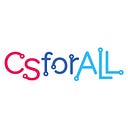How Do We Include Neurodiverse Students in Computer Science Learning? This NonProfit Has an Answer.
Tech Kids Unlimited has made a 2020 #CSforALL Commitment to Design Computer Science Learning for Neurodiverse Students during COVID.
At Tech Kids Unlimited (TKU), a NYC-based out-of-school time education organization that was piloted in 2009 and received its not-for-profit status in 2014, we work with neurodiverse students, so accessibility and engagement have always been front and center. At TKU, students’ possibilities are unlimited — when they are taught in a supportive and motivational way, the sky’s the limit. TKU staff is accustomed to taking each student’s unique learning needs into consideration as programs and curricula are planned. TKU was recently awarded a three-year National Science Foundation grant in partnership with CUNY-College of Staten Island and The Ability Project at NYU Tandon to explore evidence-based strategies to engage neurodiverse youth in informal STEM learning. Students with disabilities and/or learning challenges are just like any other student — they are creative, unique, and love making and creating digital products using their computer science education and technology skills.
Due to the coronavirus pandemic, new challenges in learning computer science have pushed TKU to examine our accessibility practices from new perspectives. This year has brought into stark clarity the gap in access to digital resources that disproportionately impacts black and brown students from under-resourced communities and the urgent need for digital equity. As students transitioned to learning online, school districts scrambled to ensure that every student had reliable internet and a device at home but fell short. In NYC, 77,000 students were still without a device heading into the 2020–2021 academic year. Though significant, the issues with digital equity do not end with access to wifi and devices. We must also take into account the necessary digital literacy skills demanded by learning content and platforms. For instance, 27,000 NYC students never logged on to summer school (nearly 25% of those enrolled), many citing glitches and confusion with the online learning portal iLearn as a barrier.
As these challenges illustrate, it is essential that we consider not only students’ individual learning needs and lesson content, but also the environments in which our students are learning.
- What device(s) are they using? Does it have a webcam? A microphone?
- Are they sharing that device with anyone else? When do they have access to it?
- Is the space they are learning in quiet or are there distractions? Do they have headphones?
- Are they using assistive technology?
- Is their internet connection consistent or spotty?
- Are all parts of their identity accepted at home?
Simply put, it is imperative now more than ever that accessibility be baked into all programming and instructional decisions. CSforALL’s 2030 Goals, include Design for Diversity — Design from the Beginning perfectly captures this sentiment. TKU students represent a range of unique learning needs, strengths, and preferences, so designing for all is integral to TKU’s approach. We strive to align our curriculum and teaching practice with the Universal Design for Learning (UDL) model, which suggests that when you design for diverse learning needs, you inherently increase access for all learners. The core principles of UDL are to provide multiple entry points for learners to connect with, interpret, and demonstrate their understanding of content.
Luckily, many of these practices translate well to remote learning. If you provide students with written instructions and visual examples to accompany a synchronous virtual lesson, it allows them to refer back to instructions or follow along at their own pace during instruction much like they would in the physical classroom. However, these supplementary resources also address challenges unique to remote learning. If a student is in a loud environment, they can refer to written instructions. If the student loses their internet signal or needs to share their device with a family member during the lesson, they can participate asynchronously when the signal returns or the device is available again.
During the Coronavirus pandemic, TKU has stretched this practice beyond our instruction to include program logistics planning by asking when, how, and why our families connect with our programs. TKU preemptively removes barriers to participation by considering the optimal length and time of online workshops, choosing free, web-based software tools available across devices, prioritizing digital tools that automatically save student work in-browser but don’t require logging in, and creating always-available supplemental resources to accompany synchronous lessons.
Finally, designing for diversity also means recognizing how emotionally demanding it is to learn amidst a pandemic, national demonstrations in response to racial violence, and a deeply divisive election, and meeting students where they are. During our online workshops since March, we have emphasized social engagement, the joy of learning, and opportunities for students to discuss and share their passions, ideas, questions, and concerns with peers while de-emphasizing finished, polished projects. Learning takes many forms and can include outcomes such as joy, exploration, and accomplishment. Neurodiverse students are here — they are in our classrooms and communities — and they are ready to learn and yearn to be interns and ultimately find employment and contribute to society.
Let’s support them through access and commit to them via CSforALL’s goals of ensuring every child receives a high quality computer science education.
About Tech Kids Unlimited: (TKU) is a NYC-based not-for-profit organization that teaches computer science thinking and technology to neurodiverse youth, teens, and young adults. Our mission is to open up the field of technology to students with disabilities, especially those with Autism Spectrum Disorders (ASD), to help them become the techies of tomorrow. By creating, developing, and sharing the tools of technology in a supportive and nurturing individualized environment, we are working to change the paradigm for education and employment for young people with disabilities. Our instructional practice is grounded in the tenets of Universal Design for Learning and our workshops emphasize Social and Emotional Learning. Please visit: techkidsunlimited.org
